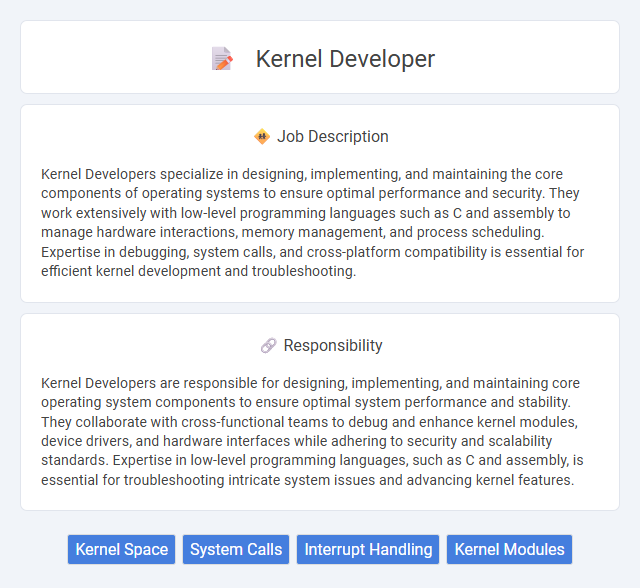
Kernel Developers specialize in designing, implementing, and maintaining the core components of operating systems to ensure optimal performance and security. They work extensively with low-level programming languages such as C and assembly to manage hardware interactions, memory management, and process scheduling. Expertise in debugging, system calls, and cross-platform compatibility is essential for efficient kernel development and troubleshooting.
Individuals with strong analytical skills and a deep understanding of operating systems will likely thrive as Kernel Developers due to the complex nature of low-level programming and system architecture. Those who enjoy problem-solving and have patience for debugging intricate code may find this role suitable, while candidates lacking attention to detail or interest in core system processes might struggle. The job probably demands continual learning and adaptability to evolving technologies, which may affect suitability for people resistant to change.
Qualification
Expertise in C and C++ programming languages is essential for a Kernel Developer, with deep understanding of operating system internals and hardware abstraction layers. Experience with Linux kernel architecture, debugging tools, and version control systems like Git significantly enhances the ability to optimize kernel performance and implement efficient device drivers. Strong problem-solving skills and knowledge of concurrency, synchronization mechanisms, and memory management are critical qualifications for developing and maintaining robust kernel code.
Responsibility
Kernel Developers are responsible for designing, implementing, and maintaining core operating system components to ensure optimal system performance and stability. They collaborate with cross-functional teams to debug and enhance kernel modules, device drivers, and hardware interfaces while adhering to security and scalability standards. Expertise in low-level programming languages, such as C and assembly, is essential for troubleshooting intricate system issues and advancing kernel features.
Benefit
Kernel developers likely experience significant benefits such as high demand for their specialized skills, leading to competitive salaries and job stability. They probably have opportunities to work on cutting-edge technology, enhancing their expertise and career growth potential. The role might also offer flexibility in work environments, including remote options and contributions to open-source projects.
Challenge
Working as a Kernel Developer likely involves tackling complex, low-level system challenges that require deep understanding of operating system architecture and hardware interaction. The role probably demands continuous problem-solving to optimize performance, ensure system stability, and debug intricate kernel-level issues. Candidates might expect a steep learning curve but also a highly rewarding environment for those passionate about core system development.
Career Advancement
Kernel Developer roles offer significant opportunities for career advancement through mastery of operating system internals, device drivers, and low-level programming languages like C. Gaining expertise in Linux kernel architecture and contributing to open-source projects can lead to senior positions such as Kernel Engineer, Systems Architect, or Technical Lead. Continuous learning and involvement in evolving technologies like real-time systems and security modules accelerate progression within tech companies and research institutions.
Key Terms
Kernel Space
Kernel Developers specialize in creating and maintaining the core components of operating systems within the kernel space, ensuring efficient hardware-software interaction and system stability. Expertise in low-level programming languages like C and assembly is essential to optimize performance and manage memory safely in privileged kernel mode. Proficiency with debugging tools, kernel modules, and understanding of system calls and interrupts significantly enhances a developer's ability to innovate and troubleshoot in the kernel space environment.
System Calls
Kernel developers specialize in implementing and optimizing system calls, which serve as essential interfaces between user applications and the operating system kernel. Expertise in managing system call performance and security is critical for ensuring efficient resource management and robust system stability. Proficiency in low-level programming languages such as C, along with in-depth knowledge of operating system architecture, enables kernel developers to design, modify, and debug system call mechanisms effectively.
Interrupt Handling
Kernel Developers specializing in Interrupt Handling design and optimize low-level software mechanisms that manage hardware interrupts, ensuring efficient CPU resource allocation and minimal latency. Their expertise includes writing interrupt service routines (ISRs), configuring interrupt request lines (IRQs), and implementing synchronization techniques to maintain system stability. Mastery in ARM, x86 architectures, and real-time operating systems enhances a developer's ability to handle asynchronous events critical for embedded and performance-critical applications.
Kernel Modules
Kernel Developers specialize in designing, implementing, and maintaining kernel modules that extend the functionality of operating systems at a low level. They write and debug code in C, ensuring efficient interaction between hardware and software components, often working with device drivers, process schedulers, and memory management subsystems. Expertise in Linux kernel architecture, synchronization, and concurrency is essential for developing stable and performant kernel modules that enhance system capabilities.
 kuljobs.com
kuljobs.com